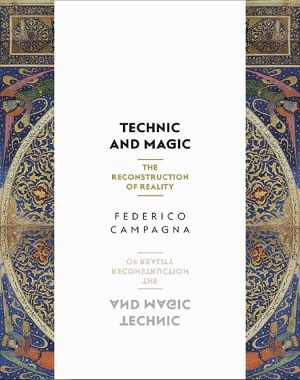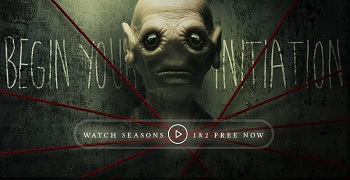Magick is the experience of truth.
Sounds more like mysticism than magick? Well, it applies equally to sorcery. Suppose we evoke a demon to obtain the perfect chalice for our altar. The result arrives by experiencing the truth of the demon having sourced the chalice for us. (We could have just searched for a nice chalice online, but instead we gave ourselves an actual experience of a demon finding it for us.)
Having recognised that magick is the experience of truth, we may then want to refine this into more direct and simpler forms of truth.
So: what is truth?
Its hallmarks are inclusivity, wholeness, unity.
A popular notion of truth is of a correspondence between an idea and a state of affairs. That is, the unity of the idea and the state of affairs. Unity is what is engineered in an act of sorcery: the synchronicity between intention and an outcome. What is omitted from the “correspondence” model of truth, however, is truth that cannot be formulated in an idea or does not depend upon a human being thinking something: in other words, truth that might be described as absolute or eternal.
The truer something is, the more it can incorporate and the less that falls outside of it. Of course, this is a very poor way to think of it because – evidently – it would be even truer to include also whatever is not a thing and also whatever fails to include anything.
Ultimate truth is that which includes everything. Platonists called it “The One”. The One is so utterly damn inclusive it even includes what is not itself – that is, the Many. In a non-dual experience this is what becomes apparent: our individual experience is the Divine yet – at the same time – only a part of the Divine.
“Avoid monism. It is lazy,” suggests Douglas Batchelor (2020: 37’32”), advocating animism as a better approach: “everything is conscious” (Batchelor 2020: 37’52”). An alternative, then, would be that there is not one consciousness in which everything participates, but everything has a separate consciousness.
The problem with animism is what constitutes an entity. If a tree has consciousness, then how about its branches, twigs and leafs? What about the molecules in the tree? How about its atoms? Do these all have separate consciousnesses? If not, then it is false that everything has a separate consciousness; if so, then how is the tree an entity when its parts are different from it?
With the One and a hierarchical relationship between the One and the Many, Platonism offers a theory of participation that makes sense of this. The Platonic Academy endured for hundreds of years, attracting great minds, so it seems unlikely that its doctrine is truly “lazy”.
What does seem lazy is the notion there is no such thing as truth. After nearly thirty years I went back to university for my therapeutic training, enduring the same postmodernist nonsense that had been there in the 1980s. But the lecturers were now the same age as myself. “Haven’t you found a way out of that crap?” I wondered.
However, the idea that nothing is true, or that no idea has a greater claim to truth than any other, is indeed more true (because it includes more) than the idea that only a certain thing is true. Postmodernism was more inclusive than the metanarratives that preceded it, which insisted on only a certain way of seeing the world as true. If truth is gold, then postmodernism discovered gold everywhere, but simultaneously put it at risk of being valued as worthless.
Postmodernism had evidently hit the buffers when the likes of Trump and Putin could clearly be seen appropriating its relativism to achieve their ends. Suddenly truth was back in fashion among liberals who had previously championed postmodernism: “Truth is more important now than ever” was the slogan of an anti-Trump New York Times campaign (New York Times 2017).
The current culture wars are due partly to the attenuated death throes of postmodernism. It is perhaps easier to imagine we are now “post-truth” (which is really just more moribund postmodernism) than to ditch the correspondence conception of truth and move towards an inclusivity model. Magick, which offers methods for the direct experience of truth, could have an important role in a progressive response to the crisis. But the magickal community is, of course, riven by the same tensions afflicting wider culture. Many are responding by clinging to either postmodernism or traditionalism.
The inclusivity model implies that all participate in truth, but not equally. Participation is increased by including more of what has been omitted. An example of these dynamics is presented by Alex Tsakiris, host of the Skeptiko podcast.
In almost every episode, Tsakiris challenges the secular materialist paradigm of human beings as “biological robots in a meaningless universe [for whom] there cannot be a moral good or bad” (Tsakiris 2021: 11’48”). For Tsakiris, materialist science wilfully ignores contrary evidence (such as near-death experience), and is so nonsensical that its dominance must indicate some kind of hidden agenda: “Science, as we know it, is best understood from a conspiratorial framework” (Tsakiris 2021: 52’16”), he suggests.
But consider the secular materialist view in comparison to the non-dual experience: Do we have a sense of individual free will within the non-dual experience? Is there still a sense of being a human individual? Is the non-dual experience helpfully describable as good, bad, or meaningful? Approached from this direction, perhaps secular materialism and the non-dual experience are less far apart. As a description of reality, secular materialism maybe does not do so badly. It is perhaps an honest attempt to transcend the ego by highlighting how small and insignificant it is on a cosmic scale. But it performs this badly, because what it omits is any relationship between reality and individual consciousness. The relationship is one of participation. In contrast, the non-dual experience is that direct participation.
To assert that there is such a thing as truth, and that it is the very same truth for all, is neither reductive nor fundamentalist, because the One includes the Many through participation. This is not to say that truth is never wilfully refused, resisted, or perverted, but it does mean it is never escaped from entirely. We participate inescapably to some degree, like the postmodernist who claims “there is no truth” which, of course, is a truth claim. We leak truth even in our refusal of it.
If there were no truth no one would bother getting out of bed. Indeed, all it takes to hinder us from getting up is the feeling or suspicion that there is no truth – it instantly puts paid to any sense of pleasure or a point to life. But by offering the means for experiencing truth, for changing our relationship to it and our participation in it, magick can be an antidote.
References
Batchelor, Douglas (2020). What magic is this? Neoplatonism. https://tinyurl.com/t4o1dkrv (whatmagicisthis.com). Accessed February, 2021.
New York Times (2017). The New York Times has a new marketing campaign. https://tinyurl.com/spqsoe6q (facebook.com). Accessed February, 2021.
Tsakiris, Alex (2021). Skeptiko #486. Curt Jaimungal, Better Left Unsaid analysis. https://tinyurl.com/16y420vt (skeptiko.com). Accessed February, 2021.


